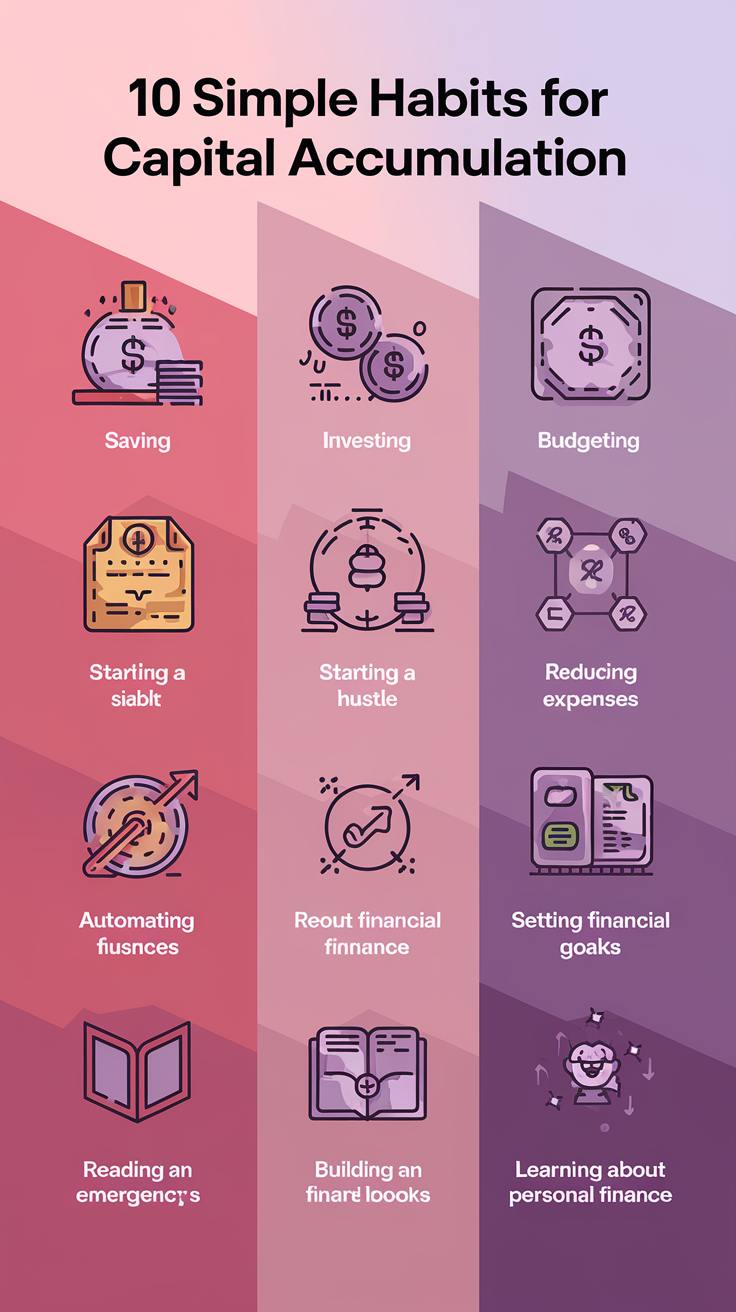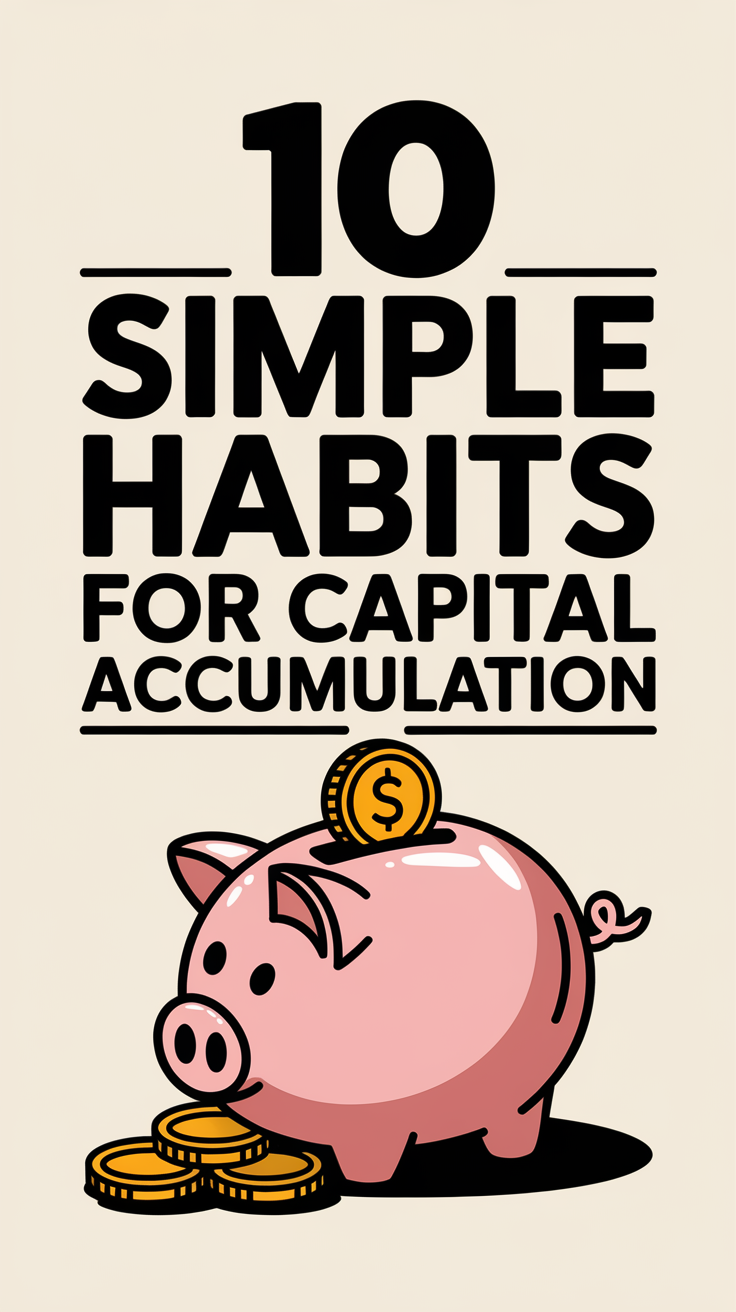10 Simple Habits for Capital Accumulation
Accumulating capital is not just about saving money; it’s about adopting smart habits that ensure consistent financial growth. Over the years, I’ve discovered strategies that truly work, and today, I’ll share them with you. These 10 simple habits can transform your financial future if you stay disciplined and committed.
1. Set Clear Financial Goals
Setting clear financial goals is the foundation of capital accumulation. It gives you direction and keeps you motivated. For instance, when I started saving for my first home, I set a specific target amount and a timeline—and that clarity kept me on track.

Steps to Achieve This:
- Break goals into short-term (e.g., saving for a vacation) and long-term (e.g., retirement funds).
- Use tools like spreadsheets or budgeting apps to track progress.
- Adjust goals periodically based on changing circumstances.
2. Create and Stick to a Budget
A budget isn’t just a plan; it’s a promise you make to yourself. Knowing exactly where your money goes can help you control your spending and maximize savings.
Monthly Budget Breakdown Table:
| Category | Percentage of Income | Amount (Example: $5,000 Income) |
|---|---|---|
| Housing | 30% | $1,500 |
| Savings/Investments | 20% | $1,000 |
| Debt Repayment | 10% | $500 |
| Living Expenses | 30% | $1,500 |
| Leisure | 10% | $500 |
3. Build and Maintain an Emergency Fund
An emergency fund is your safety net. It ensures you don’t derail your financial goals when unexpected expenses arise, like medical bills or car repairs.
Recommended Steps:
- Start small: Aim for $1,000 initially.
- Build up to 3–6 months’ worth of essential expenses.
- Use high-yield savings accounts to earn interest.
4. Save and Invest Consistently
Consistent saving and investing are keys to long-term capital growth. On my journey, I noticed that even small, regular investments compound significantly over time.

Example of Investment Growth Over Time (7% Annual Return):
| Monthly Contribution | 10 Years | 20 Years | 30 Years |
|---|---|---|---|
| $200 | $34,404 | $104,423 | $242,123 |
| $500 | $86,011 | $261,058 | $605,308 |
| $1,000 | $172,022 | $522,116 | $1,210,617 |
5. Live Below Your Means
One of the most impactful habits I’ve adopted is living below my means. It’s tempting to upgrade your lifestyle when income increases, but resisting this urge accelerates wealth accumulation.
Tips to Reduce Expenses:
- Shop for discounts or buy in bulk.
- Cancel unused subscriptions.
- Cook at home instead of eating out.
6. Diversify Your Income Streams
Relying on one income source is risky. Developing additional income streams not only boosts your savings but also cushions you during tough times.
Ideas for Diversified Income:
- Freelancing or consulting in your field.
- Investing in dividend-paying stocks or real estate.
- Selling digital products, such as eBooks or online courses.

7. Educate Yourself on Financial Literacy
Financial education is a continuous process. I’ve learned that the more you understand investments, budgeting, and taxes, the better your financial decisions become.
Resources to Enhance Financial Knowledge:
- Books like The Millionaire Next Door.
- Podcasts such as The Rich Dad Radio Show.
- Free online courses on platforms like Coursera.
8. Optimize Taxes for Wealth Building
Effective tax management plays a vital role in capital accumulation. Over the years, I’ve saved thousands by leveraging tax-advantaged accounts and deductions.
Tax Optimization Tips:
- Contribute to retirement accounts like Roth IRAs or 401(k)s.
- Use deductions for education, medical expenses, or home office costs.
- Consider working with a tax advisor for tailored advice.

9. Practice Patience and Discipline
Accumulating capital takes time. On my journey, I realized that staying disciplined—even when progress seemed slow—was critical to achieving my financial goals.
Psychological Strategies:
- Focus on long-term rewards over short-term temptations.
- Automate your savings and investments.
- Celebrate small victories to stay motivated.
10. Leverage Technology and Tools
Technology simplifies financial management, making it easier to stick to good habits. From budgeting apps to robo-advisors, these tools have been a game-changer for me.
Suggested Tools:
- Budgeting: Mint, YNAB.
- Investing: Betterment, Robinhood.
- Debt Management: Tally, Debt Payoff Planner.
Conclusion: Take Action Today
Capital accumulation is a marathon, not a sprint. By setting goals, living below your means, and consistently saving and investing, you’ll create a solid financial future. Start small, stay consistent, and watch your efforts compound over time. Remember, the best time to start was yesterday—the second best is now.
FAQs
1. How much should I save monthly to build wealth?
Aim to save at least 20% of your income, but adjust based on your goals and expenses.
2. What are the safest investments for beginners?
Consider low-risk options like index funds, ETFs, or government bonds.
3. Why is an emergency fund necessary?
It protects you from unexpected expenses, preventing financial setbacks.
4. How do I avoid overspending?
Stick to a budget and use the 24-hour rule for non-essential purchases.
5. What’s the best way to stay disciplined in saving?
Automate your savings and remind yourself of your long-term financial goals.






